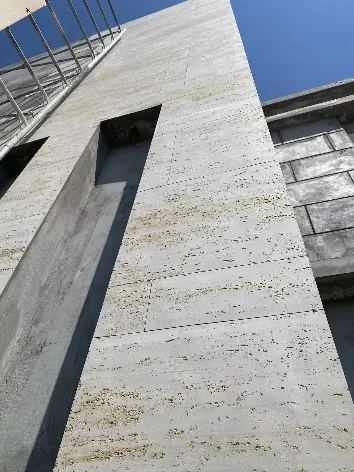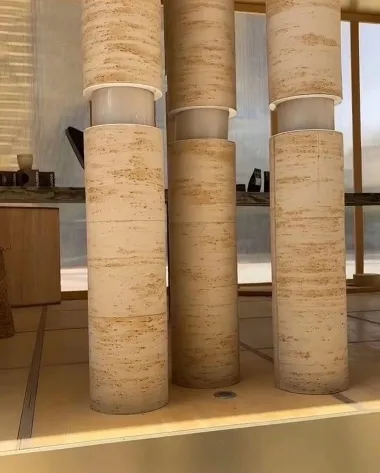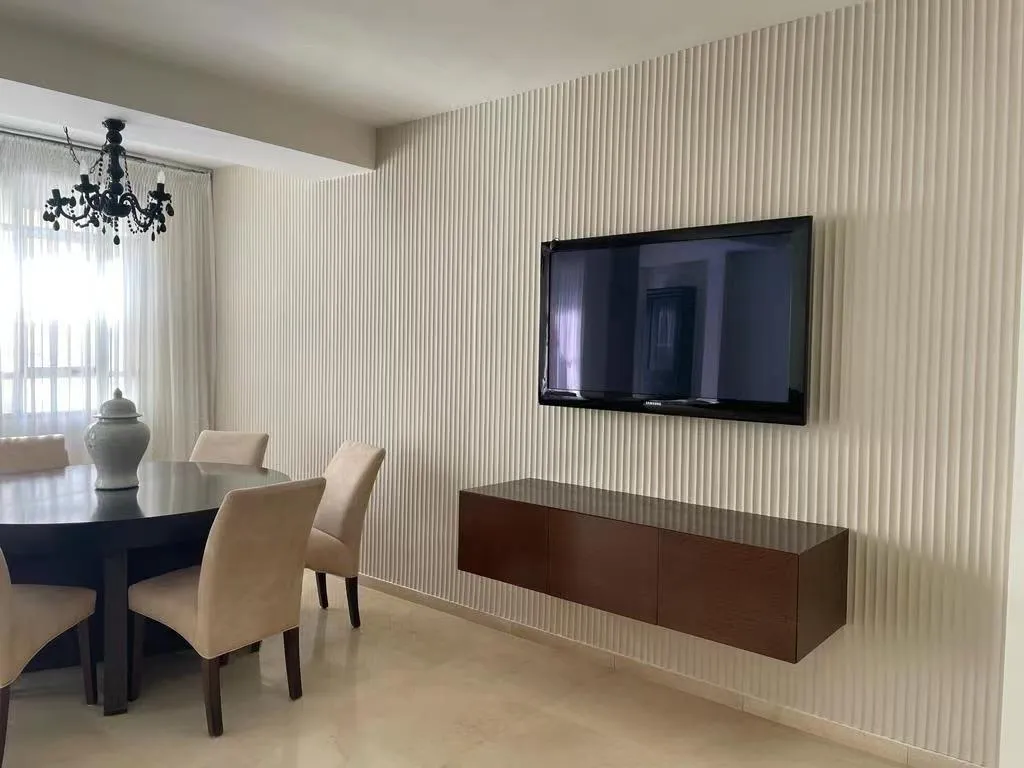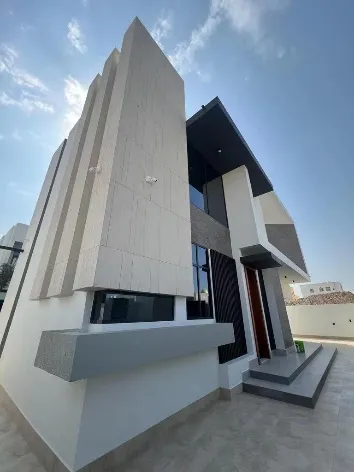
MCM Flexible Cladding Stone Wall Panels: Ideal for Middle Eastern Climate Conditions

Blending Durability, Flexibility, and Aesthetics for the Region's Unique Challenges
The Middle Eastern Climate: A Tough Test for Building Materials
Walk through the streets of Riyadh, Dubai, or Doha, and you'll immediately sense the raw power of the Middle Eastern climate. Scorching summer temperatures regularly soar above 45°C (113°F), while sandstorms—driven by hot, dry winds—blast buildings with abrasive particles. Winters bring sudden humidity shifts, and coastal areas like Jeddah face the added stress of salt-laden air. For architects, builders, and homeowners, these conditions aren't just inconveniences; they're make-or-break factors for a building's longevity, safety, and beauty.
Traditional building materials often struggle here. Natural stone, while stunning, can crack under extreme thermal expansion. Brick walls absorb heat, turning interiors into ovens. Vinyl cladding fades under relentless UV rays. The quest for a material that can withstand these challenges and elevate a building's design has long been a priority. Enter MCM flexible cladding stone wall panels—a modern solution engineered to thrive where others falter.

What Are MCM Flexible Cladding Stone Wall Panels?
MCM, or Mineral Composite Material, is a revolutionary cladding solution that marries the best of nature and technology. At its core, MCM flexible cladding stone wall panels are crafted from a blend of natural minerals, resins, and fibers, compressed into thin, lightweight sheets that mimic the look and texture of natural stone, wood, or even concrete. Unlike rigid traditional cladding, MCM panels offer flexibility—they can bend slightly without cracking, making them ideal for buildings that expand and contract with temperature swings.
A reputable MCM flexible cladding stone wall panel supplier doesn't just stop at "flexible." These panels are engineered for performance: they're water-resistant, fire-retardant, and designed to stand up to the harshest environmental conditions. For the Middle East, this means panels that won't warp under the sun, peel in humidity, or degrade when sandstorms hit.

Why MCM Panels Are a Game-Changer for the Middle East
To understand why MCM flexible cladding stone wall panels are gaining traction across Saudi Arabia, the UAE, and beyond, let's break down their key benefits—each tailored to the region's unique demands:
1. Thermal Resilience: Keeping Buildings Cool in the Heat
Middle Eastern summers are unforgiving, with direct sunlight driving surface temperatures to over 60°C (140°F). Traditional cladding materials like natural stone or brick absorb this heat, transferring it indoors and increasing cooling costs. MCM panels, however, have low thermal conductivity. Their layered structure acts as a barrier, reflecting sunlight and reducing heat absorption. This not only keeps interiors cooler but also eases the load on air conditioning systems—a critical factor for both residential and commercial building materials supplier clients looking to cut energy bills.
2. Flexibility to Withstand Thermal Expansion
Daytime heat causes building materials to expand; nighttime cooling makes them contract. Over time, this cycle can crack rigid cladding like natural stone or concrete. MCM panels, with their inherent flexibility, "give" with these movements. They bend without breaking, preventing unsightly cracks and leaks—common headaches for architects and homeowners in Riyadh and Dubai.
3. Lightweight Design: Reducing Structural Stress
Natural stone cladding is heavy, requiring reinforced structural support that adds cost and complexity to construction. MCM panels, by contrast, weigh as little as 4-6 kg per square meter—up to 70% lighter than natural stone. This lightweight nature simplifies installation, reduces labor time, and lowers overall project costs. For high-rise commercial buildings or older residential structures, this is a game-changer: it minimizes stress on foundations and allows for more creative architectural designs.
4. Low Maintenance, High Durability
Sandstorms, salt air, and humidity can take a toll on building exteriors. MCM panels are resistant to abrasion (so sand won't scratch their surface), impervious to water (preventing mold growth in humid coastal areas), and UV-stable (so colors won't fade under the sun). A quick rinse with water is often all it takes to keep them looking new—no expensive sealing or repainting required. For busy commercial building materials supplier clients managing large portfolios, this low maintenance is a huge advantage.
5. Aesthetic Versatility: Beauty Without Compromise
Middle Eastern architecture is a blend of tradition and modernity—think intricate geometric patterns, warm earth tones, and sleek, contemporary lines. MCM panels cater to this diversity. A skilled MCM flexible cladding stone wall panel supplier can customize panels to mimic the veining of marble, the texture of travertine, or even the warmth of wood. Whether designing a heritage-inspired villa or a cutting-edge commercial tower, architects can achieve the aesthetic they want without sacrificing durability.
| Cladding Type | Heat Resistance | Weight (kg/m²) | Flexibility | Maintenance Needs | Sandstorm Resistance |
|---|---|---|---|---|---|
| MCM Flexible Cladding | High (reflects heat, low conductivity) | 4-6 | Excellent (bends without cracking) | Low (rinse with water) | High (abrasion-resistant surface) |
| Natural Stone | Low (absorbs heat) | 25-30 | Poor (prone to cracking) | High (requires sealing, polishing) | Medium (prone to scratching) |
| Brick | Medium (absorbs heat, retains warmth) | 18-20 | Poor (rigid, cracks over time) | Medium (repainting needed every 5-7 years) | Low (porous, sand can erode mortar) |
| Vinyl Cladding | Low (fades, warps in high heat) | 2-3 | Medium (may crack in extreme cold) | Medium (prone to discoloration) | Low (surface scratches easily) |

Applications: From Villas to Skyscrapers
MCM flexible cladding stone wall panels aren't limited to one type of building. Their versatility makes them suitable for both residential and commercial projects, cementing their role as a go-to solution for any architectural façade solutions provider in the region.
Residential: Comfort and Curb Appeal
For a residential building materials supplier, MCM panels are a hit with homeowners. Imagine a villa in Jeddah: its exterior, clad in MCM panels that mimic the warm tones of Saudi sandstone, stands out in the neighborhood. Inside, the same panels are used as an accent wall in the living room, adding texture without overwhelming the space. Homeowners love that their cladding looks new for years, resists mold in humid coastal areas, and keeps their homes cooler—all while requiring minimal upkeep.
Commercial: Making a Statement That Lasts
Commercial buildings demand cladding that's both durable and visually striking. A hotel in Dubai's downtown, for example, uses MCM panels in a bold, geometric pattern to create a modern façade that catches the eye. A hospital in Riyadh opts for MCM panels in soft, neutral hues, prioritizing cleanliness and easy maintenance. For a commercial building materials supplier, MCM panels offer the flexibility to meet diverse client needs—whether the project is a high-end mall, a corporate office, or a healthcare facility.
Case Study 1: A Riyadh Villa's Transformation
A family in Riyadh had struggled with their traditional natural stone cladding for years: cracks appeared within 18 months, and the stone absorbed so much heat that their AC bills spiked. They turned to an MCM flexible cladding stone wall panel supplier for a solution. The new MCM panels, designed to look like the original stone, were installed in just 3 days (compared to 2 weeks for the original stone). Two years later, there are no cracks, cooling costs are down by 25%, and the villa's exterior still looks brand-new—even after multiple sandstorms.
Case Study 2: A Dubai Hotel's Modern Makeover
A 5-star hotel in Dubai wanted to refresh its façade ahead of Expo 2020. The goal: a sleek, contemporary look that could withstand the city's harsh sun and occasional sandstorms. The chosen architectural façade solutions included MCM panels in a metallic finish, arranged in a wave-like pattern. The lightweight panels reduced the need for structural reinforcement, cutting construction time by 40%. Today, the hotel's façade is a landmark—shimmering in the sun, unmarked by sand, and requiring only quarterly rinses to stay pristine.

Choosing the Right MCM Supplier: More Than Just a Vendor
Not all MCM panels are created equal. To unlock their full potential, partnering with a trusted MCM flexible cladding stone wall panel supplier is critical. Here's what to look for:
1. Local Expertise
A supplier familiar with the Middle East understands the region's climate nuances. They know which panel thicknesses work best in Riyadh's dry heat versus Jeddah's humidity. They can recommend finishes that resist sand abrasion and colors that stay vibrant under UV rays. A residential building materials supplier with local roots will also navigate logistics smoothly, ensuring timely delivery even during peak construction seasons.
2. Customization Capabilities
Every project is unique. A top supplier offers custom colors, textures, and sizes. Whether a client wants panels that match a specific stone quarry or a one-of-a-kind pattern for a commercial project, the supplier should have the technology and expertise to deliver.
3. Quality Assurance
Look for suppliers who test their panels under Middle Eastern conditions: exposing them to extreme heat, humidity, and sand abrasion in labs before sending them to site. Certifications for fire resistance, water resistance, and UV stability are non-negotiable.
Why a One-Stop Architectural Solution Provider Stands Out
The best MCM suppliers don't just sell panels—they offer end-to-end support. As a one-stop architectural solution provider, they can advise on installation techniques, provide technical drawings, and even train contractors on best practices. For busy builders and architects, this level of support turns a complex cladding project into a seamless experience.

Conclusion: MCM Panels—Built for the Middle East, Built to Last
The Middle East's climate is tough, but buildings don't have to suffer for it. MCM flexible cladding stone wall panels offer a rare combination: the beauty of natural materials, the durability to withstand heat and sandstorms, and the flexibility to adapt to the region's extreme conditions. For residential building materials supplier clients seeking to create comfortable, low-maintenance homes, and commercial building materials supplier clients aiming to make a lasting impression, MCM panels are more than a choice—they're an investment in longevity and beauty.
As the region continues to grow and innovate, MCM cladding will undoubtedly play a starring role in its architectural future. So, whether you're designing a villa, a hotel, or a commercial complex, consider this: when the sun blazes and the sand blows, will your cladding stand strong? With MCM, the answer is yes.
Tags:
Recommend Products










